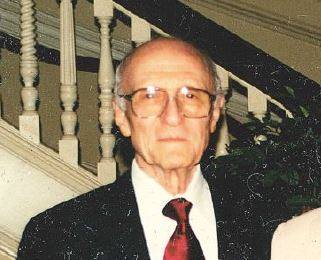
S. Sidney Ulmer, 94, Professor Emeritus of Political Science at the University of Kentucky, passed away at his home in Lexington on 19 January 2018. Although frail of body, his mind was sharp and lucid to the end.
Prof. Ulmer was born on 15 April 1923 in North, South Carolina, to Shirley S. and Anna Reed Ulmer. Ulmer came of age during World War II and he served in the U.S. Army Air Force as a tail gunner on B-24 bombers for 44 missions during 1943-45 in the South Pacific. He earned a number of medals and citations and afterward he was an active member of the 31st Bomb Squadron Association.
Following the war, Ulmer worked his way through Furman University with the help of the G.I. Bill, graduating cum laude in 1952. He then went on to earn an M.A. (1954) and Ph.D. (1956) in Political Science at Duke.
After earning his doctorate, Ulmer took a position at Michigan State University, which had an up-and-coming young faculty in the late ‘50s and ‘60s. Among them were Glendon Schubert and Harold Spaeth, who – contrary to the traditional, doctrinal approach of seeing judges as objective appliers of the Constitution and law – studied the behavior of Supreme Court justices quantitatively to show how their political attitudes shaped their legal decisions. Ulmer’s application of this Attitudinal Model of judicial behavior used sophisticated statistical tools, but his work tended to be theoretically oriented. He believed that the study of politics should be a science – not as precise as physics, perhaps, but reasonably explainable through the application of testable theories of human behavior.
In 1963, Ulmer left MSU to become Chair of the Political Science Department at the University of Kentucky with a mandate to bring it into the new world of political behavior. This charge was a challenge. The department, like many Political Science departments in the South, had been a rather sleepy one, making little impact on the profession at the time. But times were flush for academia in the 1960s – even in Kentucky – so Ulmer had the resources to grow his faculty. He doubled the department’s size in his six years as chair. Nine new faculty members came to campus in 1966 alone, some eventually becoming prominent in the discipline.
Ulmer stepped down as chair in 1969 and returned his primary attention to his research, authoring classics in the subfield of judicial behavior – including “Dissent Behavior in the U.S. Supreme Court” (J. of Politics, 1970) and “Selecting Cases for Supreme Court Review: An Underdog Model” (APSR, 1978).
Not all of Ulmer’s work was quantitative. “Earl Warren and the Brown Decision” (J. of Politics, 1971) used the justices’ papers to explore the Chief Justice’s influence. Some articles probed into the politics of the 1787 Constitutional Convention. He wrote about political influences on the Illinois and Michigan supreme courts and about some aspects of military justice. All in all, he published 56 journal articles, most of them peer reviewed. Additionally, he authored 21 contributions to edited books. He wrote four books himself, and edited three others. In honor of his research accomplishments, Ulmer was presented the “Lifetime Achievement Award” by APSA’s Law & Courts Section in 2003.
Ulmer preferred to conduct research alone even after collaboration became more common in Political Science. His graduate students were occasional co-authors. Ulmer and emeritus professor Bradley Canon, meanwhile, once collaborated to write an APSR commentary about the Supreme Court and “critical elections” after they discovered, while talking at a departmental picnic, that both writing on the same topic.
Ulmer was quite active in the profession. He served as President of the Southern Political Science Association in 1971-72 and serves program chair for both the SPSA and the Midwest Political Science Association. He served terms on the editorial boards of the top three crossover journals in the field: the American Political Science Review, the American Journal of Political Science, and the Journal of Politics. Ulmer also was active on campus, perhaps best illustration by his 17 years as chair or board member of the UK Credit Union.
Ulmer retired in 1988 at age 65, but he attended the department annual awards banquet for the next 25 or so years. His wife Margaret predeceased him, passing away in 2012. Five children survive: Margaret Moye and Mary Ulmer-Jones, both of Atlanta; William Emmett Ulmer of Coarsegold, CA; Susan Blake of Lexington; and John Lipscomb Ulmer of Brookfield, WI. He left behind 13 grandchildren and eight great-grandchildren. Contributions in his memory may be made to the S. Sidney and Margaret L. Ulmer Endowed Scholarship Fund, Sturgill Bldg., University of Kentucky, Lexington, KY 40506-0015.
